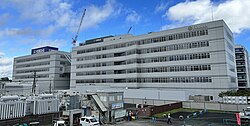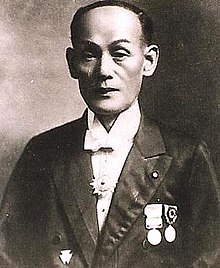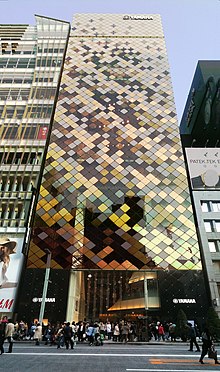Yamaha Corporation
 | |
 Yamaha Corporation's headquarters in Hamamatsu, Japan | |
Native name | ヤマハ株式会社 (Japanese) |
|---|---|
Romanized name | Yamaha kabushiki gaisha |
| Formerly | Nippon Gakki Co., Ltd. (1887–1987) |
| Company type | Public |
| |
| Founded | October 12, 1887 |
| Founder | Torakusu Yamaha |
| Headquarters | 10-1, Nakazawacho, Naka-ku, Hamamatsu, Shizuoka , Japan |
Area served | Worldwide |
Key people | Takuya Nakata (president and Representative Executive Officer) |
| Products | Musical instruments, audio equipment |
| Revenue | |
Number of employees | 28,112 (including temporary employees) (2017)[1] |
| Subsidiaries | List
|
| Website | yamaha.com |
| Footnotes / references [3][2] | |
Yamaha Corporation (ヤマハ株式会社, Yamaha Kabushiki gaisha, /ˈjɑːmɒˌhɑː/; Japanese pronunciation: [jamaha]) is a Japanese musical instrument and audio equipment manufacturer.
It is one of the constituents of Nikkei 225 and is the world's largest musical instrument manufacturing company.[4]
The former motorcycle division was established in 1955 as Yamaha Motor Co., Ltd., which started as an affiliated company but has been spun-off as its own independent company.
History
[edit]
Nippon Gakki Co., Ltd. (日本楽器製造株式会社, Nihon Gakki Seizō Kabushiki gaisha, lit. 'Japan Musical Instrument Manufacture') was established in 1887 as a reed organ manufacturer by Torakusu Yamaha (山葉寅楠) in Hamamatsu, Shizuoka Prefecture and was incorporated on 12 October 1897. In 1900, the company manufactured the first piano to be made in Japan,[5] and its first grand piano two years later. In 1987, 100 years after the first reed organ built by Yamaha, the company was renamed Yamaha Corporation in honor of its founder.[6] The company's origins as a musical instrument manufacturer are still reflected today in the group's logo—a trio of interlocking tuning forks.[7][5]
After World War II, company president Genichi Kawakami repurposed the remains of the company's war-time production machinery and the company's expertise in metallurgical technologies to the manufacture of motorcycles. The YA-1 (AKA Akatombo, the "Red Dragonfly"), of which 125 were built in the first year of production (1954), was named in honour of the founder. It was a 125cc, single cylinder, two-stroke street bike patterned after the German DKW RT 125 (which the British munitions firm, BSA, had also copied in the post-war era and manufactured as the Bantam and Harley-Davidson as the Hummer). In 1955,[8] the success of the YA-1 resulted in the founding of Yamaha Motor Co., Ltd., splitting the motorcycle division from the company. Also, in 1954 the Yamaha Music School was founded.[5]
Yamaha has grown into the world's largest manufacturer of musical instruments (including pianos, "silent" pianos, drums, guitars, brass instruments, woodwinds, violins, violas, cellos, and vibraphones), and a leading manufacturer of semiconductors, audio/visual, computer related products, sporting goods, home appliances, specialty metals, and industrial robots.[9] Yamaha released the Yamaha CS-80 in 1977.
In 1983, Yamaha made the first commercially successful digital synthesizer, the Yamaha DX7.
In 1988, Yamaha shipped the world's first CD recorder.[10] Yamaha purchased Sequential Circuits in 1988.[11] It bought a majority stake (51%) of competitor Korg in 1987, which was bought out by Korg in 1993.[12]

In the late 1990s, Yamaha released a series of portable battery operated keyboards under the PSS and the PSR range of keyboards. The Yamaha PSS-14 and PSS-15 keyboards were upgrades to the Yamaha PSS-7 with short demo songs, short selectable phrases, and sound effects.[13]
In 2002, Yamaha closed its archery product business that was started in 1959. Six archers in five different Olympic Games won gold medals using their products.[14]
In January 2005, it acquired German audio software manufacturer Steinberg from Pinnacle Systems. In July 2007, Yamaha bought out the minority shareholding of the Kemble family in Yamaha-Kemble Music (UK) Ltd, Yamaha's UK import and musical instrument and professional audio equipment sales division. It was renamed Yamaha Music U.K. Ltd in late 2007.[15] Kemble & Co. Ltd, the UK piano sales & manufacturing arm, was unaffected.[16]
On 20 December 2007, Yamaha made an agreement with the Austrian Bank BAWAG PSK Gruppe to purchase all the shares of Bösendorfer,[17] with Yamaha intending to continue manufacturing at the Bösendorfer facilities in Austria.[18] The acquisition was announced on 28 January 2008, after the NAMM Show in Los Angeles. As of 1 February 2008, Bösendorfer Klavierfabrik GmbH operates as a subsidiary of Yamaha Corporation.[19]
Yamaha electronics have proven to be successful, popular, and respected products. For example, the Yamaha YPG-625 was awarded "Keyboard of the Year" and "Product of the Year" in 2007 from The Music and Sound Retailer magazine.[20] Other noteworthy Yamaha electronics include the SHS-10 Keytar, a consumer-priced keytar which offered MIDI output features normally found on much more expensive keyboards.
Business Segments
[edit]Yamaha is segmented into three primary business domains of musical instruments, audio equipment, and others (industrial machinery and components, etc.)[21]
- Musical Instruments – the manufacture and sales of pianos; digital musical instruments; wind, string, and percussion instruments; and other music-related activities.
- Pianos
- Digital Musical Instruments
- Winds, Strings/Percussion
- Guitars
- Audio Equipment – the manufacture and sales of audio products, professional audio equipment, information and telecommunication equipment, and certain other products.
- Consumer
- Yamaha Home Audio
- B2B
- Yamaha Pro Audio
- Yamaha Unified Communications, Inc.
- Consumer
- Industrial Machinery and Components (IMC) & others – electronic devices business, automobile interior wood components, factory automation (FA) equipment, golf products and a resort business.
Living room business
[edit]The company began by manufacturing high-end furniture based on its expertise in wood processing for piano manufacturing, and was spun off into a separate company in 1991 with the establishment of YAMAHA Livingtec (YLT). The company manufactured and sold unit baths, system kitchens, and other products. In 1992, the company decided to stop selling system furniture, and after narrowing down its product lineup, it terminated orders and production in 2005 March.[22]
In 2010, Yamaha sold its 85.1% stake in YLT to Japan Industrial Partners and three foreign investment funds as part of a restructuring. At this point, the YAMAHA brand and company name continued, but the company essentially withdrew from management. Subsequently, YLT conducted a MBO of the investments of Yamaha and the investment funds, and the company name was changed as of 1 October 2013[23][24] and withdrew from the housing equipment business in both name and reality.
Subsidiaries
[edit]Other companies in the Yamaha Corporation group include:[2]
- Ampeg
- L. Bösendorfer Klavierfabrik GmbH
- Line 6
- Steinberg Media Technologies GmbH
- Yamaha Artist Services, Inc.
- Yamaha Corporation of America
- Yamaha Drums
- Yamaha Fine Technologies Co., Ltd.
- Yamaha Music Communications Co., Ltd.
- Yamaha Music (Asia) Private Limited
- Yamaha Music Europe GmbH
- Yamaha Music Australia Pty. Ltd.
- Yamaha Guitar Group, Inc
- Yamaha Pro Audio
- Yamaha Unified Communications, Inc.
Corporate mission
[edit]Kandō (感動) is a Japanese word used by Yamaha Corporation to describe its corporate mission. Kandō is the sensation of profound excitement and gratification derived from experiencing supreme quality and performance.[25] Some reasonable English equivalents are "emotionally touching" or "emotionally moving".
Yamaha Music Foundation
[edit]Yamaha Corporation is widely known for its music teaching program that began in 1954. In a continuation of that program, the Yamaha Music Foundation was established by the authority of the Japanese Ministry of Education for the purpose of promoting music education and music popularization In 1966.[26]
Products
[edit]Yamaha expanded into many diverse businesses and product groups. The first venture into each major category is listed below.[27]
- 1887 Reed organs
- 1900 Pianos
- 1903 Furniture
- 1914 Harmonicas
- 1922 Audio equipment (crank phonograph first)
- 1942 Guitars
- 1955 Motorcycles – made by Yamaha Motor Company, which started as an affiliated company of Nippon Gakki (Yamaha Corporation's name at the time) but is a separate company today
- 1959 Sporting goods (starting with archery)
- 1959 Music schools
- 1961 Metal alloys
- 1965 Band instruments (trumpet first)
- 1967 Drums
- 1971 Semiconductors
- 2000 Yamaha Music Communications (record company)
- 2001 Yamaha Entertainment Group (record company)
-
Yamaha Grand Piano
-
Yamaha Keyboard
-
Yamaha Drumset
-
Yamaha Saxophone
-
A collection of Yamaha Guitars
-
Yamaha Acoustic Guitar Amp
-
Yamaha Mixing Console
-
Yamaha Hi-Fi
-
Yamaha Sound Chip
-
Yamaha AV Receiver
-
Yamaha Speakers
-
Yamaha DVD Player
Synthesizers and samplers
[edit]Yamaha announced the singing synthesizer Vocaloid for the first time at the German fair Musikmesse on 5–9 March 2003.[28]
Yamaha began the sale and production of Vocaloid applications, starting with Lily which was later sold via Internet Co., Ltd.'s website. Their involvement continued with the VY series, with VY1 being the first, released in deluxe and standard editions on 1 September 2010.[29] The VY series is a series designed to be a high quality product for professional musicians. The series is also designed with the intention to set a new standard for the Vocaloids for having no face, sex, or set voice, but are designed to complete any song.[30] VY1 has a new approach to how the software handled the database of samples and improved the performance of the Vocaloid 2 engine.
Yamaha announced a version of the Vocaloid 2 software for the iPhone and iPad, which exhibited at the Y2 Autumn 2010 Digital Content Expo in Japan.[31][32] Later, this version of the software was released using the VY1 voice.[33][34] VY2 will also be released for this version of the software.[35]
Factory locations
[edit]In Japan, the company maintains three factories for musical instrument manufacture, engine and various vehicle manufacture (motorcycles and marine products), with all factories located in Shizuoka Prefecture.
- Kakegawa Factory
- 1480, Ryoke, Kakegawa-shi, Shizuoka
- Toyooka Factory
- 203, Matsunokijima, Iwata-shi, Shizuoka
- Tenryu Factory
- 283, Aoyacho, Minami-ku Hamamatsu-shi, Shizuoka
Sports teams
[edit]See also
[edit]- List of phonograph manufacturers
- List of studio monitor manufacturers
- Yamaha Motor Company
- Yamaha Pro Audio
- mLAN
- Yamaha XG
References
[edit]- ^ a b c d Annual Report 2017 Archived 6 March 2018 at the Wayback Machine
- ^ a b c "Yamaha Group Companies".
- ^ "Yamaha Corporate Profile".
- ^ Fosler-Lussier, Danielle (2020). Music on the Move. University of Michigan Press. p. 123.
- ^ a b c "Brand and History - About Us - Yamaha Corporation". Yamaha.com. Yamaha. Retrieved 1 July 2018.
- ^ Lenhoff, Alan; Robertson, David (2019). Classic Keys: Keyboard sounds that launched rock music. Denton, Texas, USA: University of North Texas Press. p. 337. ISBN 9781574417760.
- ^ "Yamaha Corporate Information". Yamaha Global. Yamaha Corporation. Archived from the original on 12 December 2006. Retrieved 31 December 2006.
- ^ "Yamaha Motor". Forbes Global 2000 List.
- ^ "Yamaha Corporate History". Yamaha Corporation of America & Yamaha Corporation. Retrieved 26 April 2011.
- ^ Verna, Paul (3 April 1999). "CD-R Enjoys Massive Growth In A Wide Range Of Markets". Billboard. Retrieved 21 March 2018.
- ^
Gordon Reid (March 1999). "PROPHET LINE — Sequential Circuits: Prophet Synthesizers 5 & 10 (Retro)". Sound On Sound. Archived from the original on 29 March 2004.
1989-1999 In 1988, Yamaha bought the rights and assets of SCI, and these rights included the employment contracts of many of the company's development team, including Dave Smith himself. … Then, in 1989, the team moved to Korg, where they designed the now-classic Wavestations. …
- ^
Gordon Reid (November 2002). "40 Years Of Gear — The History Of Korg: Part 2". Sound On Sound. Archived from the original on 19 November 2003.
1987 … However, in 1987, the relationship took another huge step forward when Yamaha bought a controlling interest in Korg Inc, effectively making it a subsidiary."; "1993 … Thanks to the products developed using the funds from Yamaha's cash injection in 1987, the previous five years had been very successful, and Tsutomu Katoh now had some cash at his disposal. In fact, he had enough to buy out the majority of Yamaha's share in Korg. So he did.
- ^ "PSS-14 Portable Keyboard". Yamaha.
- ^ "YAMAHA to Close Archery Products Business". Yamaha Corporation. 1 February 2002. Archived from the original on 16 January 2004. Retrieved 30 April 2008.
- ^ "Cancellation of Joint Venture Contracts for Sales Subsidiaries in U.K. and Spain". Yamaha Global website. 10 July 2007. Archived from the original on 17 November 2007. Retrieved 23 January 2008.
- ^ Barrett, Andy (10 July 2007). "Yamaha buys out Kemble family". MI Pro. Archived from the original on 9 June 2008. Retrieved 23 January 2008.
- ^ Jean Chen, Shu-Ching (30 November 2007). "Yamaha Outplays Local Competition For Bösendorfer". Forbes. Retrieved 5 December 2023.
- ^ "Yamaha Reaches Basic Agreement with Austrian Bank to Purchase All Shares of Bösendorfer". Yamaha Global. 20 December 2007. Archived from the original on 7 January 2008. Retrieved 23 January 2008.
- ^ "Bosendorfer Klavierfabrik GmbH". Business Week. 3 March 2008. Archived from the original on 9 June 2008.
- ^ "YPG-625 - 88-key Weighted Action Portable Grand". Yamha Corporation of America & Yamaha Corporation. Archived from the original on 14 May 2010. Retrieved 24 January 2009.
- ^ "Yamaha Corporate Profile 2023" (PDF). Yamaha Corporate Communications Division. 2023.
- ^ Notice Regarding Discontinuation of Production of Yamaha Furniture Products(24 December 2004, Yamaha Livingtec News Release)
- ^ Notice of Capital Structure and Trade Name Change(28 June 2013, Yamaha Livingtec News Release)
- ^ Yamaha Livingtec MBOs under the name Toklas (28 June 2013, Nihon Keizai Shimbun)
- ^ "Yamaha Corporate Mission". Yamaha Motor UK.
- ^ "Yamaha Music Foundation History". Yamaha Music Foundation.
- ^ "Yamaha History". Corporate Information, Global website. Yamaha Corporation. Retrieved 13 November 2012.
- ^ "New Yamaha VOCALOID Singing Synthesis Software Generates Superb Vocals on a PC". Business Wire. AllBusiness.com. 4 March 2003. Retrieved 25 October 2010.
- ^ "新型ボーカロイド「VY1」公開です!" [New Model Vocaloid "VY1" Presentation!] (in Japanese). Bplats. 13 August 2010. Archived from the original on 17 July 2011. Retrieved 13 August 2010.
- ^ Okada, Yuka (13 August 2010). "キャラクターなしのVOCALOID「VY1」 初のヤマハ製、9月発売" ["VY1", a Vocaloid With No Character, First Yamaha-Made, Sold in September] (in Japanese). IT Media. Retrieved 5 September 2010.
- ^ "デジタルコンテンツEXPO:VOCALOIDがiPad/iPhoneアプリに ヤマハが開発" [Digital Content Expo: Vocaloid Becomes iPad/iPhone Applications. Yamaha Develops Those] (in Japanese). IT Media. 14 October 2010. Retrieved 17 October 2010.
- ^ "Y2 Autumn 2010 | Digital Content Expo 2010" (in Japanese). Digital Content Expo. Archived from the original on 7 October 2010. Retrieved 17 October 2010.
- ^ "iVOCALOID-VY1" (in Japanese). Apple Inc. Retrieved 13 December 2010.
- ^ "iVOCALOID-VY1t" (in Japanese). Apple Inc. Retrieved 13 December 2010.
- ^ Matsuo, Kōya (15 April 2011). "コードネームは「勇馬」 ヤマハ純正のイケメンボカロ「VY2」の話を聞いてきた" [Codename Is "Yūma". I Heard the Story of the Yamaha Pure Cool Vocalo "VY2"] (in Japanese). IT Media. Retrieved 28 April 2011.
External links
[edit]- Yamaha Corporation
- Japanese companies established in 1887
- 1940s initial public offerings
- Brass instrument manufacturing companies
- Clarinet manufacturing companies
- Compact Disc player manufacturers
- Companies based in Shizuoka Prefecture
- Conglomerate companies established in 1887
- Companies listed on the Tokyo Stock Exchange
- Companies in the Nikkei 225
- Conglomerate companies of Japan
- Electronic organ manufacturing companies
- Fuyo Group
- Guitar amplifier manufacturers
- Guitar effects manufacturing companies
- Guitar manufacturing companies
- Headphones manufacturers
- Japanese brands
- Loudspeaker manufacturers
- Microphone manufacturers
- Multinational companies headquartered in Japan
- Music equipment manufacturers
- Musical instrument manufacturing companies of Japan
- Percussion instrument manufacturing companies
- Phonograph manufacturers
- Piano manufacturing companies of Japan
- Recorder makers
- Robotics companies of Japan
- Synthesizer manufacturing companies of Japan
- Unmanned aerial vehicles of Japan
- Unmanned aerial vehicle manufacturers
- Vocaloid production companies
- Hamamatsu












